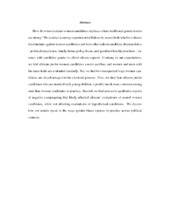(How) Do Voters Discriminate Against Women Candidates? Experimental and Qualitative Evidence From Malawi
Peer reviewed, Journal article
Accepted version
Permanent lenke
https://hdl.handle.net/1956/21958Utgivelsesdato
2020Metadata
Vis full innførselSamlinger
Originalversjon
https://doi.org/10.1177/0010414019858960Sammendrag
How do voters evaluate women candidates in places where traditional gender norms are strong? We conduct a survey experiment in Malawi to assess both whether citizens discriminate against women candidates and how other salient candidate characteristics—political experience, family status, policy focus, and gendered kinship practices—interact with candidate gender to affect citizen support. Contrary to our expectations, we find citizens prefer women candidates ceteris paribus, and women and men with the same traits are evaluated similarly. Yet, we find two unexpected ways women candidates are disadvantaged in the electoral process. First, we find that citizens prefer candidates who are married with young children, a profile much more common among men than women candidates in practice. Second, we find pervasive qualitative reports of negative campaigning that likely affected citizens’ evaluations of actual women candidates, while not affecting evaluations of hypothetical candidates. We discuss how our results speak to the ways gender biases operate in practice across political contexts.
